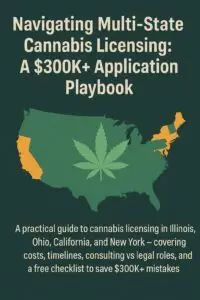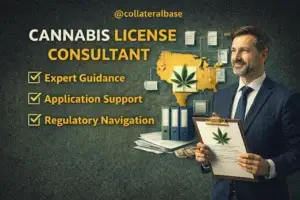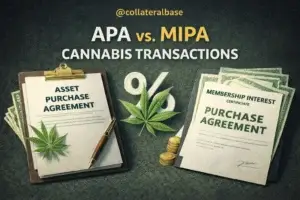Introduction to Multi-State Cannabis Licensing: The High-Stakes Cannabis License Game
 Getting a cannabis license in one state is hard enough – doing it in multiple states is a whole new level of crazy. If you’re eyeing Illinois, Ohio, California, and New York all at once, brace yourself. This isn’t a leisurely stroll through the park; it’s more like running an obstacle course where each state throws different hurdles at you. And let’s be blunt (pun intended): you’ll be sinking $300,000+ into this endeavor before you even sell a gram.
Getting a cannabis license in one state is hard enough – doing it in multiple states is a whole new level of crazy. If you’re eyeing Illinois, Ohio, California, and New York all at once, brace yourself. This isn’t a leisurely stroll through the park; it’s more like running an obstacle course where each state throws different hurdles at you. And let’s be blunt (pun intended): you’ll be sinking $300,000+ into this endeavor before you even sell a gram.
In this playbook, we’ll break down how these four states’ licensing frameworks compare, what costs and timelines to expect, and which parts of the process are consultant-led vs attorney-led. By the end, you’ll have a clearer roadmap – plus a downloadable checklist to keep your multi-state cannabis dreams on track.
Consider this your no-nonsense guide from someone who’s as skeptical about bureaucratic B.S. as you are (but who also knows there’s real money on the line). Let’s dive into the state-by-state gauntlet and figure out how to not waste that $300K.
Multi-State License Frameworks: Illinois, Ohio, California & New York
Every state has its own way of handing out cannabis licenses – knowing these differences is half the battle. Here’s a quick state-by-state rundown:
Illinois
A limited-license, highly competitive state. The law caps dispensaries at 500 statewide, and if applications exceed slots (they will), a lottery ultimately decides who wins. Illinois heavily favors social equity applicants in its scoring process. Be ready to pay about $5,000 to apply and $60,000 in license fees if you win (plus a $50,000 bond). The timeline is slow – often around a year from application to license due to extensive scoring reviews and potential legal challenges. In short, Illinois is high stakes and high cost.
Ohio
A hybrid merit system with strict license limits (e.g., only ~50 new dispensaries for adult use). Applications are competitively scored, and only the top applicants win. Ohio’s fees are significant – about $5,000 to apply and $80,000 for a license – and regulators expect you to show ample capital (think $250,000+). The timeline is moderate: roughly 6-12 months from submission to license awards, which is more predictable than Illinois. Still, competition is stiff for those limited slots.
California
No statewide cap on licenses – in theory, anyone who qualifies can get one. But you must secure local city or county approval first, and many local governments have bans or strict limits. In practice, your fate lies in local licensing processes (some are merit-based, others lotteries, many just not available). Costs vary widely: state fees are modest, but local fees and required community investments can run tens of thousands. Timeline depends on the locality – it could be a few months in a friendly city or over a year in a competitive one. Bottom line: California is “open” at the state level but full of local hurdles. Success means mastering each city’s rules.
New York
A tightly controlled rollout with priority for social equity applicants. New York initially reserved retail licenses for “justice-involved” entrepreneurs (those with past cannabis convictions). The application process is merit-based and very detailed. Fees are relatively low – about $1,000 to apply and a few thousand for the license (50% off for qualified equity candidates). But the timeline has been slow. Bureaucracy and lawsuits mean even winners wait many months to open. The upside: if you fit New York’s social equity profile and submit a strong application, you have a decent shot, as the state is actively looking to diversify who gets in.
Bottom line: Illinois and Ohio offer limited golden tickets, California is open-but-local, and New York is slow and equity-focused. You must tailor your approach in each – one size will not fit all.
Consultant vs. Attorney: Who Does What?
Multi-State Cannabis Licensing is a team sport. On one side, you have cannabis consultants – industry experts who know the application process, operations, and business strategy inside-out. On the other, you have attorneys – legal pros who ensure you’re not breaking laws and that all your documents and structures are kosher. You’re paying good money, so let’s clarify what each should be doing (and when you need one, the other, or both):
What the Cannabis Licensing Consultant Handles
- Application Project Management: Think of the consultant as the general contractor for your license application. They coordinate the many moving parts – compiling documents, filling forms, hitting deadlines – and make sure your submission meets each state’s requirements in substance and style.
- Business Plan & Financials: A consultant will help draft the robust business plan, financial projections, and operating plan that most states demand. In Illinois and New York, for example, these are worth major points in scoring. Consultants craft a narrative that sells your vision and proves you understand how to run a compliant, profitable cannabis business.
- Standard Operating Procedures (SOPs): Regulators love to see thick binders of SOPs – security protocols, inventory tracking methods, compliance procedures. A good consultant has templates for these and tailors them to meet state rules, ensuring your SOPs sound airtight.
- Site Selection & Community Engagement: Many consultants help with real estate – finding a compliant location zoned for cannabis. In California, this is critical since local approval is everything. They’ll also guide required community outreach or support letters to increase the odds that the locals (and thus the state) say yes.
- Application Writing and Design: These applications can run hundreds of pages. A consultant takes the lead in writing narrative answers, assembling attachments, and making the package look professional – presenting your team’s experience and plans in a way that stands out.
In short, consultants focus on the strategy and substance of the application itself. They’re industry veterans who know how to make your application shine.
What the Attorney Handles
- Entity Formation & Ownership Structure: Before you apply, you need a legal entity (or several). An attorney forms your LLCs or corporations, drafts operating agreements, and ensures your ownership structure complies with local laws – crucial for states like Illinois and New York with specific ownership rules.
- Regulatory Compliance Advice: Lawyers parse the fine print of state laws, advising on what’s required and what to avoid. They act as your legal alarm system, catching issues before regulators do.
- Contracts and Agreements: From real estate leases to investor deals, an attorney drafts and reviews contracts to ensure compliance and protect your interests. They include contingency clauses to safeguard your investment.
- Compliance Structuring: Financing and ownership changes require legal finesse. Attorneys structure these to meet state limits and ensure future flexibility.
- Responding to Legal Challenges: If your application is denied or challenged, the attorney handles appeals or hearings – a last resort, but they’re ready if needed.
In sum, the attorneys for Multi-State Cannabis Licensing focus on legal compliance and protecting your interests. They work hand-in-hand with the consultant: one gets you a high score, the other ensures nothing derails it.
The $300K Playbook: Steps to Multi-State License Success
Now that you know the Multi-State Cannabis Licensing landscape and have your team, let’s outline the playbook to execute this multi-state campaign. Here’s how to not burn through that $300K for nothing:
- Plan Your Targets and Strategy: Decide which licenses to pursue and prioritize based on your chances and resources. Map out a timeline aligned with application windows.
- Assemble Your Dream Team: Engage a primary cannabis licensing consulting team at Collateral Base to lead the project, plus local experts and attorneys as needed. Define roles clearly to avoid burnout.
- Budget and Fund Appropriately: Create a budget covering fees, professional costs, and reserves. Allocate your $300K wisely and secure funding to show regulators you’re serious.
- Develop Core Application Materials: Build reusable business plans, financials, and SOPs, then customize them for each state. Use our checklist to ensure completeness.
- Secure Real Estate and Local Approvals: Lock down compliant properties with contingent leases and start local approvals early – a key step to stand out.
- Submit Quality Applications: Triple-check everything and submit on time. An attorney’s final review can catch costly errors.
- Survive the Wait: Monitor updates, respond to clarifications, and prepare for next steps or a Plan B if needed.
Follow this playbook to turn your multi-state venture into a success, not a fiasco.
Conclusion: Ready to Launch – Get Your Checklist and Expert Help
Multi-state cannabis licensing is not for the faint of heart (or light of wallet). We’ve compared state frameworks, outlined costs, and given you a playbook to follow. Now it’s up to you to act – with the right help.
Grab our Multi-State Cannabis License Application Checklist – a tool covering all essential to-dos for each state’s application. Use it as your compass.
Don’t go it alone. Collateral Base’s cannabis consulting team can lead on business plans, SOPs, and strategy, while Howard Law Group handles legal compliance. Serious about winning licenses and protecting your $300K+ investment? Reach out for a consultation – we’ll give you a no-BS evaluation and roadmap.
Call to Action: Ready to make your multi-state cannabis venture a reality? Contact us today for a strategy session. Get experts in your corner and navigate this maze to the finish line.
In an industry where a single license can unlock seven-figure opportunities, preparation is everything. Let’s get you there, together.
Disclaimer: This guide is for general informational purposes for Multi-State Cannabis Licensing and not legal advice. Cannabis regulations change frequently and vary by jurisdiction. Always consult current statutes and qualified attorneys for your specific situation. Licensing success isn’t guaranteed, but preparation significantly improves your odds.





